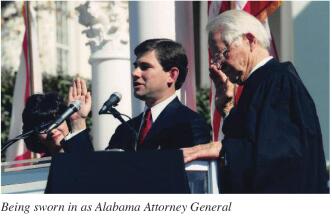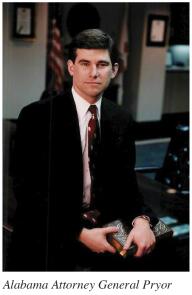One of the Good Guys–pryor Becomes Chief Judge of the Eleventh Circuit
| Jurisdiction | United States,Federal |
| Citation | Vol. 82 No. 2 Pg. 0102 |
| Pages | 0102 |
| Publication year | 2021 |
By Taylor A. Meehan and Kasdin M. Mitchell

Judge William H. Pryor, Jr. became Chief Judge of the United States Court of Appeals for the Eleventh Circuit in June 2020, making him the highest-ranking officer of his court. It's not exactly where a young Bill Pryor thought his career would take him. The Mobile-born son of a band director was more likely to make a career in music than as a lawyer, let alone as one of the most prominent federal judges in the country.
Partway through college, Pryor changed course from music major to legal studies. In law school, he graduated in the top of his class and was elected editor-in-chief of the Tulane Law Review. He then clerked for a civil rights hero, Judge John Minor Wisdom. His own clerkship with Judge Wisdom was transformative. So much of Pryor's career can be traced back to Wisdom, one of the Fifth Circuit judges who was instrumental in dismantling segregation in the Deep South.
What came next for Pryor is the stuff of a great screenplay: Alabama Attorney General by age 34, the youngest in the country at the time; involved in the prosecutions of two Ku Klux Klan murderers who perpetrated the 16th Street Baptist Church bombings; prosecuted former Alabama Chief Justice Roy Moore after he defied a federal court order; and nominated to the federal bench by age 40.

His nomination was not without drama. Pryor's Senate confirmation hearing was held 40 years to the day that Governor Wallace stood in a schoolhouse door and declared "segregation now, segregation tomorrow, segregation forever." Alabama Democrats, including former Alabama Chief Justice Sue Bell Cobb, former U.S. Attorney and Senator Doug Jones, and state representative Alvin Holmes, joined with Alabama Republicans to support Pryor's nomination. His supporters praised him specifically for his contributions to the great progress made by the state in those four decades. They repeated Pryor's memorable rejoinder to Wallace-"Equal under law today, equal under law tomorrow, equal under law forever"-delivered in Pryor's second inaugural address as attorney general.1 They spoke of Pryor's leadership in bringing criminal sentencing reform to Alabama-a harbinger for Pryor's later service on the U.S. Sentencing Commission. They highlighted that Pryor personally argued before the Alabama Court of Criminal Appeals to uphold the conviction of one of the 16th Street Baptist Church bombers. And they commended Pryor for authoring the legislation to make cross-burning a felony and for leading the long-overdue effort to erase an old ban on interracial marriage from Alabama's constitution.

Pryor was unlike many recent judicial nominees. He had not carefully planned his life to position himself to become a federal judge. His personal beliefs were well-known. He had spent years as a politician. He was "no shrinking violet," in the words of then-Senate Judiciary Chair Orrin Hatch.2
Pryor's judicial philosophy has been that judges have no authority to use personal beliefs "to update or alter the text of our...
To continue reading
Request your trial
